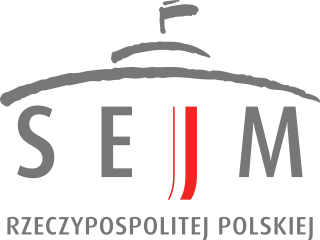
The Sejm, officially known as the Sejm of the Republic of Poland, is the lower house of the bicameral parliament of Poland.

Wojciech Witold Jaruzelski was a Polish military general, politician and de facto leader of the Polish People's Republic from 1981 until 1989. He was the First Secretary of the Polish United Workers' Party between 1981 and 1989, making him the last leader of the Polish People's Republic. Jaruzelski served as Prime Minister from 1981 to 1985, the Chairman of the Council of State from 1985 to 1989 and briefly as President of Poland from 1989 to 1990, when the office of President was restored after 37 years. He was also the last commander-in-chief of the Polish People's Army, which in 1990 became the Polish Armed Forces.

Marek Marian Belka is a Polish professor of economics and politician who has served as Prime Minister of Poland and Finance Minister of Poland in two governments. He is a former Director of the International Monetary Fund's (IMF) European Department and former Head of Narodowy Bank Polski. He has served as a Member of the European Parliament (MEP) since July 2019.

Włodzimierz Cimoszewicz is a Polish left-wing politician who served as Prime Minister of Poland for a year from 7 February 1996 to 31 October 1997, after being defeated in the Parliamentary elections by the Solidarity Electoral Action (AWS). He was born in Warsaw.

Józef Oleksy was a Polish left-wing politician who served as Prime Minister of Poland from 7 March 1995 to 7 February 1996, when he resigned due to espionage allegations. He was chairman of the Democratic Left Alliance.

The Greens is a political party in Poland.

Danuta Maria Hübner(née Młynarska, Polish:[daˈnutaˈxʲybnɛr] or ; born 8 April 1948) is a Polish politician and Diplomat and Economist and Member of the European Parliament. She has served as European Commissioner for Regional Policy from 22 November 2004 until 4 July 2009, when she resigned to become a Member of European Parliament for the Civic Platform. In 2012, Professor Hübner became a member of the International Honorary Council of the European Academy of Diplomacy.
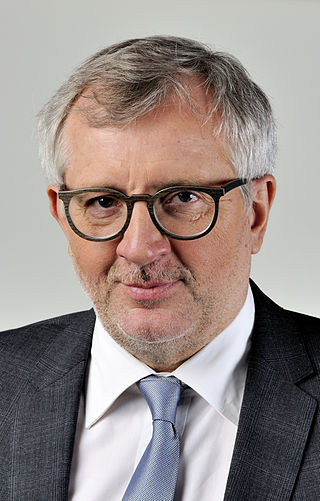
Marek Maciej Siwiec is a Polish politician and journalist.

Jan Jerzy Kułakowski was a Polish politician and Member of the European Parliament for the Greater Poland Voivodship (2004–2009) with the Freedom Union, part of the Alliance of Liberals and Democrats for Europe and sat on the European Parliament's Committee on Employment and Social Affairs.

The parliament of Poland is the bicameral legislature of Poland. It is composed of an upper house and a lower house. Both houses are accommodated in the Sejm and Senate Complex in Warsaw. The Constitution of Poland does not refer to the Parliament as a body, but only to the Sejm and Senate.
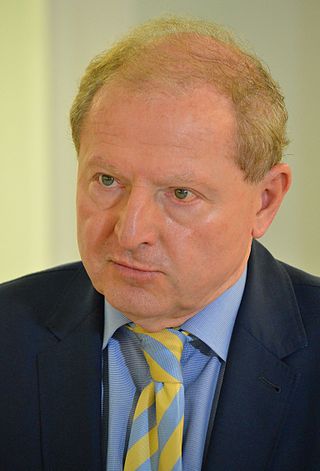
Tadeusz Iwiński is a Polish politician. He was from 1991 to 2015 a member of the Sejm, elected to represent the Olsztyn electoral district from the list presented by the Democratic Left Alliance. He had earlier (1967–1990) been a long-serving member of the communist Polish United Workers Party.
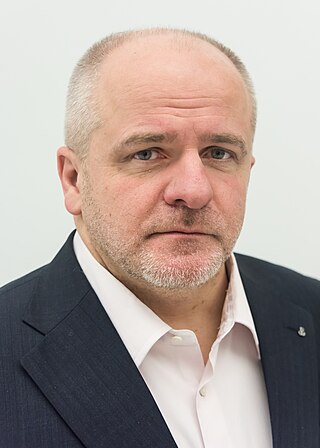
Paweł Robert Kowal is a Polish politician and former Member of the European Parliament. During his time in the EP, he served as the Chairman of the EU-Ukraine Parliamentary Cooperation Committee in the European Parliament.

Marek Wacław Sawicki is a Polish politician who has been serving as a member of the Sejm since 1993. He also served as Minister of Agriculture and Rural Development on two occasions.

Beata Maria Szydło is a Polish politician who has served as a Member of the European Parliament (MEP) since 2019. A member of Law and Justice (PiS), she previously served as Prime Minister of Poland from 2015 to 2017. Szydło became the third woman to hold the office, after Hanna Suchocka and her immediate predecessor Ewa Kopacz. She currently is a vice-chair of the European Conservatives and Reformists (ECR) group in the European Parliament.

Emanuelis Zingeris is a Lithuanian philologist, museum director, politician, signatory of the 1990 Act of the Re-Establishment of the State of Lithuania, currently serving as a Member of the Seimas, chairman of its foreign affairs committee, Vice President of the Parliamentary Assembly of the Council of Europe and President of the Parliamentary Forum of the Community of Democracies. A Lithuanian Jew, he has been director of the Vilna Gaon Jewish State Museum, honorary chairman of Lithuania's Jewish community, and is Chairman of the International Commission for the Evaluation of the Crimes of the Nazi and Soviet Occupation Regimes in Lithuania. He is a founding signatory of the Prague Declaration on European Conscience and Communism, that proposed the establishment of the European Day of Remembrance for Victims of Stalinism and Nazism.
Sawicki is a Polish surname. Other language equivalents:
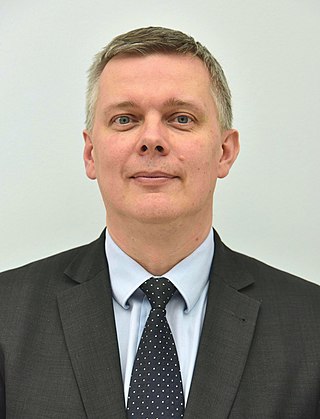
Tomasz Siemoniak is a Polish politician of the Civic Platform (PO) who served as Minister of National Defence in the governments of Prime Ministers Donald Tusk and Ewa Kopacz from 2 August 2011 to 16 November 2015 and Deputy Prime Minister of Poland under Kopacz from 22 September 2014 to 16 November 2015.

Mátyás Eörsi is a Hungarian politician who was the leader of the liberal Alliance of Liberals and Democrats for Europe in the Parliamentary Assembly of the Council of Europe (ALDE-PACE) Group in the Parliamentary Assembly of the Council of Europe (PACE). He became a member of the PACE in 1994. On 6 March 2009 the Hungarian government nominated Eörsi to Secretary General of the Council of Europe.
Despina Chatzivassiliou-Tsovilis is the Secretary General of the Parliamentary Assembly of the Council of Europe (PACE), a body which brings together 306 parliamentarians from the national parliaments of the 46 Council of Europe member states. She was elected to the post in January 2021 by the members of the Assembly for a five-year term of office beginning on 1 March 2021, and heads a multinational secretariat of around 80 staff based in Strasbourg, France. She is the first woman to hold the post since the Assembly was created in 1949, and the first person of Greek nationality.
Miroslaw Sawicki was a physics teacher, activist and civil servant. The former director of the central examination commission was also the Minister of National Education and Sports in 2004–2005, and Minister of National Education in 2005.


















